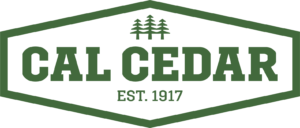During the research phase for the writing of our company history “The Story of CalCedar: 100 Years of Pencil Supply History” one of the interesting documents unearthed in our company and family archives was a 1905 patent awarded to Philip Berolzheimer for a series of creative geometrical shaped pencil displays.
Tag Archive for: Pencil Art and Creativity
 This post is in celebration of the launch of the new Palomino Blackwing 602 we release for sale at midnight tonight and as a fun way to share my own poetic creativity this month given our contest themes. Thus I’ve written my own “Ode to Blackwing” shared here below. Not a great literary effort, but I had fun writing it anyway. A more detailed account of this pencil’s history can be found here or here. Anyway I hope it will inspire you to check out and participate in our Drawing and Writing Contests this month to win free Palomino Blackwing and Palomino Blackwing 602 pencils.
This post is in celebration of the launch of the new Palomino Blackwing 602 we release for sale at midnight tonight and as a fun way to share my own poetic creativity this month given our contest themes. Thus I’ve written my own “Ode to Blackwing” shared here below. Not a great literary effort, but I had fun writing it anyway. A more detailed account of this pencil’s history can be found here or here. Anyway I hope it will inspire you to check out and participate in our Drawing and Writing Contests this month to win free Palomino Blackwing and Palomino Blackwing 602 pencils.
Ode to Blackwing
Written by Charles “WoodChuck” Berolzheimer
There once was a pencil, it was really the thing.
Went by the name of Eberhard-Faber Blackwing
Produced a graphite line so smooth and clean
No pencil could rival it’s metallic lacquer sheen.
It felt like butter as it slid across the page
had an extendable flat eraser, though that tended to age.
They called it the 602, said it wrote with half the pressure, twice the speed
Some really thought this pencil fit their special need.
Was favored by writers, musicians, artists and more.
From whom creative juices would never cease to pour
Steinbeck, Thomas Wolfe and the poet MacLeish
Their creative energies were really unleashed.
Musical numbers from Overton, Sondheim and Riddle
To them other pencils were just second fiddle.
Animations galore from Chuck Jones and his ilk,
with flowing lines that went down smooth as silk.
The old Faber factory sold to one, then another
That special graphite formula maybe lost forever
When the corporation saw no profit in fixin’ a machine
The Blackwing days were bound to get a little lean
The Boston Athenaeum, it’s scholars and librarian
Bought up the old stock and started a hoardin’
Selling Blackwings by the pencil for 20, 30, 40 bucks a pop!
And a legend began to grow, the 602 was headed over the top
Then along came the Palomino with it’s deep, rich graphite feel
The bloggers all said that for a buck a pencil that’s quite a deal
The mighty orange pony kept a trotting slow and steady
Building up a stable of riders until the time was a ready
And one by one the old Blackwing fans kept asking
Won’t you please bring back that extending eraser thing
Our 602s are getting scarce and even more costly
To be used only when the muses strike us hotly
So Woodchuck toiled and tinkered, thinking how can it be done?
There’s just not enough volume, it’ll cost a ton.
But he finally got the nerve up to take the big risk
Ordered the eraser tooling and prayed business would be brisk
He designed the new pencils to be dark, soft and smooth
With a black lacquer finish he thought would really groove
He worried some small gold flecks were a bit too profuse
So sought feedback from bloggers, and all hell broke loose.
Where’s that gray, metallic finish? What about my pink eraser?
No 602? And why did you drop that slogan, Half the Pressure?
Yes, it’s super smooth and darker than the Eberhard Faber
But boy we sharpen so often, it really takes some labor.
Still they came, they bought and the Palomino Blackwing was born
Better than an iPad? asked the Globe as they tooted the horn
So Pegasus came down on Mt. Helicon from the heavens
Thus creating the spring, where gathered the muses, seven
So writers, artists, musicians and pencil fans
Were pleased to have Blackwings back in their hands
Their pencil creativity unleashed once again
Putting pencil to paper, smooth as gel pen
But, upon Woodchuck his mind still did nag
That he did not yet have success in the bag
So back to the drawing board to work on version two
To refine this pencil for those he wished still to woo.
A new formulation of graphite so firm and smooth
It lasts one-third longer and that is the truth
Back came the slogan Half the Pressure, Twice the Speed
As his customer’s notions he wished to heed
A shiny new finish to match the old Faber
With polished brilliance of a brand new sabre
So sure to cure those long and weary blues
Of those who mourn Eberhard-Faber 602s
I’ve got the Blackwing Blues.
Sick of paying 30 bucks for my 602’s.
Can’t Draw! Can’t Write!
But everything’s gonna be alright
Cause the Palomino’s comin’ out tonight!
 I received the attached photo and note from Matt Downey demonstrating how he’s using our Palomino pencils for his musical efforts.
I received the attached photo and note from Matt Downey demonstrating how he’s using our Palomino pencils for his musical efforts.
“Hey here is what is called a sketch, rough musical ideas on paper that will eventualy find their way into a peice. In this case the second movement of a string quartet. I love sketching with this Palomino pencil. The line is good and dark and the lead is nice and smooth. The wood has that smell (you know the one I mean) and it is all so conductive to the creative impulse in me. Sketching could be called material generation for the purpose of composing but I like to think of it as composing anyway even though it is so incomplete.-Matt
PS – I think you can spy a Mongol chilling in the backround. play an I SPY game with it.”
Yeah, I see it there in the corner and am glad to spot a ForestChoice pencil as well. Thanks for sharing and keep on creating.
 A recent comment on my earlier post “Wood Cased vs. Mechanical” questioned the relative environmental impacts of manufacturing these two types of pencils. I responded with a brief comment referring to a previous study commissioned by the Incense Cedar Institute a number of years back that reviewed the “cradle to grave” lifecycle impacts of Incense-cedar pencils to extruded plastic pencils and I believe also pencils which used composite slats produced from “recycled” paper. We’re currently working to dig that old study up since the material would likely make for an interesting Timberlines post. However, it turns out the timing happens to be appropriate now to discuss one important aspect of the this life cycle given the introduction of our new Palomino Wood Crafter Hobby Kit. This aspect is the importance of developing markets for By-products in not just wood products manufacturing but any other industry for that matter.
A recent comment on my earlier post “Wood Cased vs. Mechanical” questioned the relative environmental impacts of manufacturing these two types of pencils. I responded with a brief comment referring to a previous study commissioned by the Incense Cedar Institute a number of years back that reviewed the “cradle to grave” lifecycle impacts of Incense-cedar pencils to extruded plastic pencils and I believe also pencils which used composite slats produced from “recycled” paper. We’re currently working to dig that old study up since the material would likely make for an interesting Timberlines post. However, it turns out the timing happens to be appropriate now to discuss one important aspect of the this life cycle given the introduction of our new Palomino Wood Crafter Hobby Kit. This aspect is the importance of developing markets for By-products in not just wood products manufacturing but any other industry for that matter.
Certainly with the increasing costs of raw material inputs over time there are both important financial and environmental benefits to developing by-product markets. There is a long tradition in the forest products industry of developing by-product markets for what originally was considered waste wood developed as a result of the primary lumber of finished wood products being manufactured. Typical wood by-products from sawmilling and remanufacturing facilities include: low/off grade lumber, bark, wood blocks, chipper stock and wood chips as well as shavings and sawdust. Some of these have long been used in other products such as generating pulp to make paper or cardboard products. However, in many cases even as recently as forty years ago many such by-products in the US forest products industry we’re simply “hogged” up and burned off at the manufacturing site to prevent their accumulation. The old “teepee” shaped burner was a common sight adjacent to most sawmills. Fortunately, a combination of new clean air regulations and the improved overall efficiency and economic benefit of finding higher value markets has prevailed for a net reduction as well as the maintenance of lower total cost of manufactured wood products to consumers.
Today a whole host of by-product markets have been developed to make use of such materials. Examples include landscape bark, pet bedding, hog fuel for co-generation of electricity, Oriented Strand Board, Flake board and more. Eastern Red Cedar, a formerly important pencil wood species, is today used for production of closet linings and specialty wood items. Given this specied aromatic qualities, the waste sawdust is often distilled to extract cedar oil which is used as an essential oil base in many perfumes and household products.
Our own company has a strong history of being a leader in the area of by-products market 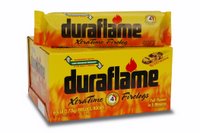 development to utilize materials from our cedar slat operations. In 1969 we developed the first wood-wax manufactured firelog from our Incense-cedar sawdust by combining this with microcrystalene waxes, a “bottom of the barrell” type by-product from the petroleum industry. This product eventually became our Duraflame firelog which burns cleaner with less emmissions than firewood. Today with our slat manufacturing relocted to China Duraflame continues to use some Incense-cedar fiber from other wood products operations in California, but increaingly have expanded by using other sawdust and waste wood frm other manufacturers as well as agricultural by-products and new natural wax substitutes.
development to utilize materials from our cedar slat operations. In 1969 we developed the first wood-wax manufactured firelog from our Incense-cedar sawdust by combining this with microcrystalene waxes, a “bottom of the barrell” type by-product from the petroleum industry. This product eventually became our Duraflame firelog which burns cleaner with less emmissions than firewood. Today with our slat manufacturing relocted to China Duraflame continues to use some Incense-cedar fiber from other wood products operations in California, but increaingly have expanded by using other sawdust and waste wood frm other manufacturers as well as agricultural by-products and new natural wax substitutes.
With our Incense-cedar pencil slat production our “Primary” driver products are reffered to as “wide ply” Select quality slats. These typically yield 8 to 10 pencils wide per slat depending upon the diameter of the pencil being produced. Our production of smaller narrow ply and shorter memo slats as well as lower grade recovery slats in addition to the prefered Select wide ply slats assures higher total yields of slats and pencils from the inbound Pencil Stock lumber. Marketing of such slats requires working closely with our pencil manufacturing customers to help them achieve the benefits of lower wood costs that can be obtained since there are generally trade offs in terms of efficiency and throughput. Memo slats for example are now a leading raw material source to produce “shorter” Cosmetic pencils. Certain narrow ply slats are more favorable for carpenter pencil widths than standard wide ply, etc. Slats even shorter than memos or narrower than standard production slats are also fingerjointed or now even edge glued to produce the wider standard length slats preferred by our customers for maximum throughput efficiency. Also now in our Thailand pencil facility we simply produce pencils ourselves on an OEM basis from Low Grade Slats for our other customers who prefer to focus just on using our more efficient higher quality slats in their higher labor cost environments.
With relocation of our pencil slat operations to China we have faced new challenges to develop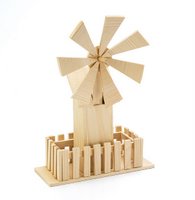 higher value by-product markets for that. The Chinese market demographics and consumption patterns do not match up well for investment in Duraflame firelog production and freight costs from China to US for this type of heavy product are prohibitive. Most of our waste product has been sold of as lower value chips or hog fuel. While our expanding fingerjoint and edge glue operations will help we still have components of our waste stream have natural defects that are not appropriately recoverable into either process. Formerly, some such product was sold as is for craft purposes. However, given the lower labor cost structure in China we are able to recover and further process this waste streams in ways not previously possible n the US. As such we have developed and are pleased to introduce our Palomino Wood Crafter Kit. The first product is now available on our new eBay Pencil World Creativity Store Craft Materials Page. (Note: We’re just selling from a very limited sample shipment of the prototype packs and waiting for arrival of regular inventory stock so if we sell out keep checking back on the Craft Materials page)
higher value by-product markets for that. The Chinese market demographics and consumption patterns do not match up well for investment in Duraflame firelog production and freight costs from China to US for this type of heavy product are prohibitive. Most of our waste product has been sold of as lower value chips or hog fuel. While our expanding fingerjoint and edge glue operations will help we still have components of our waste stream have natural defects that are not appropriately recoverable into either process. Formerly, some such product was sold as is for craft purposes. However, given the lower labor cost structure in China we are able to recover and further process this waste streams in ways not previously possible n the US. As such we have developed and are pleased to introduce our Palomino Wood Crafter Kit. The first product is now available on our new eBay Pencil World Creativity Store Craft Materials Page. (Note: We’re just selling from a very limited sample shipment of the prototype packs and waiting for arrival of regular inventory stock so if we sell out keep checking back on the Craft Materials page)

See “Write Shirt” post over at the Pencil Revolution.
This is a photo I took of the print I have hanging in my office. It appears to be the same print on the Wright t-shirt. It is a layout of the pencils reputed to have been laying around Wright’s working space at the time of his death.
Back to the creative side for a day.
We generally think of the use of pencils to generate art. However, it seems the pencil itself is continually viewed as a source of inspiration for artistic expression in several media. Here are links to a few interesting examples:
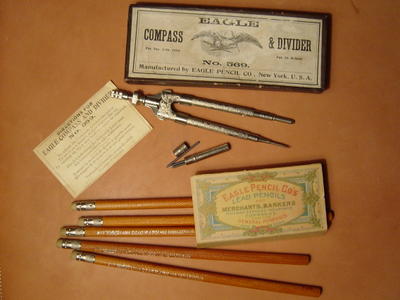
Given my family history in the in the pencil industry it’s not too surprising I tend to have a wide selection of pencils stashed in desks, drawers, closets and cabinets around my house, my office and even the car. A few years back when redecorating my home office I spent some time actually going through pencils that had accumulated over the years. Some even dated to my childhood that found their from that of my parents when an old desk and group of boxes were delivered as part of their own cleanout process.
Among the clutter there were indeed a few gems from a collecting standpoint. Since that time I have become increasingly interested though not always too active in broadening and expanding my collection. This collection includes not just pencils themselves but old advertising materials I feel have some of historical or design interest. A few my own personal pencil favorites relate to our family heritage within the industry dating back to the 19th century with the Berolzheimer und Ilfelder and the early 20th century from the Eagle Pencil Company. The Eagle Diagraph pencils shown here have a very interesting knurled effect in that they were rolled in a steel die which imprinted the surface to provide this interesting texture in order to improve grip. The compass is one of my favorites due to the detailed design in the metal work. For more views of various Eagle brand pencils visit the Pencil Images Gallery at Doug Martin’s Pencil Pages. His site is the most extensive online respurce dedicated to collectors.
Pencils are of course considered collectables by children and adults alike. People specialize within their collections in all sorts of forms such as advertising pencils, old brands and their transitions and developments throughout the years, coloring pencils, carpenter pencils, cosmetic pencils, etc. In Japan, a few years back a few producers even developed a series of “game” pencils decorated with popular cartoon characters with each side of the hexagonal pencil representing a different outcome when the pencil was rolled. Children battle it out on pencil rolls for the fate of their game character pencils.
So what gems might you have stashed away in a drawer somewhere?
As a participant in the writing instrument industry I suppose I like many of us get caught up in the day to day business of making and selling pencils, pens, markers, various components, etc. We focus daily on the details of communicating with and understanding the needs of our customers; analyzing and improving costs and quality, planning and keeping up with growth trends by market segment and assessing our competitors. Many even have made detailed efforts to better understand the actual use of our products from the perspective of the artist, the student, the office worker, the carpenter, perhaps even the Astronaut. Collectively as an industry we know everything there is to know about making and selling pencils and pens.
But how do we use pencils and pens ourselves? Do we see these simply as the products through which we make our living? Or is there a creative group among us actively using our own products for writing, journaling, drawing or some other means of self expression? As a multi generational family participant in the pencil industry I feel a strong personal affinity and tradition related to our company’s products and the role these products eventually play in allowing people to express themselves or contribute to the learning process.
For my own part I have never considered myself to be a very artistic person. I have experimented with both journaling and drawing, though I cannot claim to be particularly talented or committed to regular practice of either. It’s usually something I’ll do during a vacation; writing in my fishing journal about that day’s adventure and inc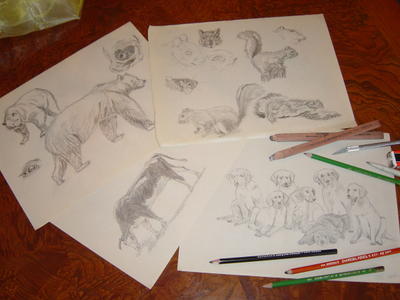 luding a simple sketch. I find that it’s a relaxing and refreshing activity when I’m in a reflective mood in the evening.
luding a simple sketch. I find that it’s a relaxing and refreshing activity when I’m in a reflective mood in the evening.
A couple years back given the encouragement and gift of drawing and sketching pencils from our good friends at General Pencil Company I once spent several days during our annual Christmas holiday on Little St. Simons Island trying my hand at sketching. I worked from a book on how to draw animals and these are the photos of some of what came of that experiment. I tried a bit of color pencil drawing, but found that’s not yet within my capability.
So what are your own creative efforts with pencil, pen or paint? Share a comment or e-mail me a digital photo of your own efforts and I’ll include it in a follow up post. If you don’t think your the artistic type you’ll never know unless you give it the effort. For a little inspiration visit General’s Art Gallery.
